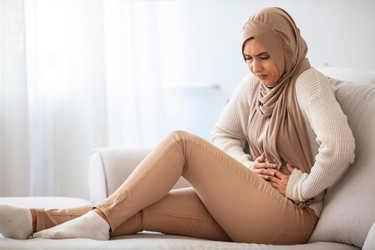PMS and PMDD
Posted by Wombilee on Apr 9th 2023

Ever wondered why you felt irritated, annoyed, and half crazy right before your period hit? Or, why do you feel sudden mood swings, abdominal cramps, breast tenderness, and alteration in your appetite or sleep patterns, even when you have a regular menstrual cycle?
Be at ease. It's not uncommon; almost 80% of women with regular healthy menstrual health report unpleasant physical and psychological symptoms right before their periods. For most women, these symptoms are mellow and endurable. However, for others, they can be formidable.
So, if you are one of the beautiful ladies who get disabled by intolerable pre-period problems, we have researched a complete guide for you to understand what PMS and PMDD are, what causes these disorders, and how you can relieve the symptoms.
What is PMS?
Premenstrual syndrome, abbreviated as PMS, refers to a group of physical, psychological, and behavioral symptoms that occurs a week or two before your period and diminishes with the onset of blood from a female's vagina.
PMS is widely shared among females of reproductive ages. It affects almost 30-80% of women and is characterized by symptoms like abdominal cramping, joint pain, lethargy, severe mood swings, depression, anxiety, memory disturbance, and changes in sleep patterns.
What is PMDD?
Premenstrual dysphoric disorder, or PMDD, is a rather severe form of PMS characterized by acute premenstrual mood disturbance. This form of the disorder can worsen with impaired social and occupational settings, as well as climatic conditions. Like PMS, PMDD also occurs in women during their reproductive ages, during the second half of their menstrual cycle, and just before their period.
In most women, the symptoms of PMDD worsen over time and are extremely difficult in the perimenopause period.
The risk factors include a personal history of irritability or behavioral problems, family history of mood fluctuations, and stress or anxiety between the 20s and 30s. Sudden sadness or tearfulness, anxiety, depression, breast tenderness, headache, swelling of genitals, fatigue, and sleep disturbances are some of the few symptoms of PMDD.
PMS vs. PMDD
At first glance, PMDD and PMS might seem identical, but in actuality, PMDD is extraordinarily severe and mostly related to psychological and behavioral problems. Significant symptoms that are different in both PMS and PMDD are as follows.
Depression
A female suffering from PMS might get depressed and sad, but for women suffering from PMDD, sadness is so extreme that she might feel hopeless and suicidal.
Anxiety
The same goes for anxiety, a little tolerable level of anxiety is okay, but a person with PMDD might feel on edge.
Detachment
Typically, PMS doesn't detract from social situations, but PMDD makes a person stop caring about work, study, eating, sleeping, or other routine chores. Women suffering from PMDD might also detach themselves from family and friends, closing all doors to feeling better.
Mood fluctuations
Bursting into high-pitched laughter soon after scolding someone or crying your eyes out after hysterically laughing explains the mood swings of a person suffering from PMDD. A woman suffering from PMS faces significant mood swings, but in PMDD, the mood dysfunctionality is acute. Everything is irritable. You pick fights over minor issues and won't let anyone make you feel better when you're suffering from PMDD.
Causes
The causes of PMS and PMDD are yet unknown. However, several studies suggest that hormonal changes significantly affect serotonin deficiency causing these syndromes. Similarly, the role of calcium and magnesium has also been researched, as both minerals vary during menstruation. Mood disorders such as anxiety or depression can also be linked with PMS or PMDD. Genetics, caffeine, and smoking also play a crucial role.
Symptoms
PMS affects more than 80% of women of reproductive age, while PMDD only affects 3-8% of females. Women that mild PMS don't even need to visit a doctor. Many symptoms of PMS and PMDD are pretty similar such as:
• Breast tenderness
• Headaches and fatigue
• Muscular and joint pain
• Sleep problems
• Change in appetite
• Bloating
• Abdominal cramps
• Back pain
• Nausea
• Mood swings
• Depression
• Memorization problems
• Irritability and aggressiveness
Diagnosis
There aren't any formal tests to confirm if you have PMS or PMDD. However, a doctor might ask you to fill out a chart for several weeks to confirm that the timing of your symptoms fits the profile of this very syndrome. You should consult a doctor if your symptoms come a week or two before your periods and go away when you start bleeding.
Treatment Through Natural Remedies
The bottom line suggests that PMS and PMDD are both linked to hormonal imbalances and make women weak mentally and physically. There are several natural remedies and alterations that you can make in your daily life to relieve some of the symptoms of these menstruation-related problems.
• Eating smaller portions daily helps you feel fuller and regulates bowel movements.
• Avoid caffeine, alcohol, and other harmful chemicals.
• Limit salt to reduce bloating.
• Engage in regular aerobic exercises, such as cycling, walking, jogging, swimming, etc.
• Take B vitamins and mineral supplements such as calcium and magnesium to help with menstrual regularity.
• Eat a fiber-rich diet and take plenty of fluids.
• Excess estrogen can be eliminated from the body by ensuring bowel regularity.
• Mediate regularly to maintain psychological health.
• Try to stay happy and away from stress.
• Talk therapy, such as cognitive behavioral theory, helps with mood fluctuations and depression.
Clinical Treatments
Apart from natural remedies and herbal treatments, there are certain medicinal drugs that a medical professional might suggest to limit the damage caused by PMS and PMDD.
• Anti-depressants such as serotonin reuptake inhibitors (SSRIs), such as Prozac, Sarafem, and others, and sertraline may help fight against emotional symptoms, fatigue, and eating/sleeping problems.
• Birth control pills stop ovulation and might relieve PMS symptoms.
• Ibuprofen, naproxen, or other non-steroidal anti-inflammatory drugs can help ease discomfort, abdominal cramps, and muscular pain.
• Diuretics, also called water pills, help remove excess fluid from the kidneys, relieving the body of some PMS symptoms.
End Note
If you feel irritated or have any other symptoms, it's best to record your symptoms, their triggers, and timings. Consult a doctor if your symptoms persist for more than six months, and change your diet and routine habits accordingly.
Vitamin supplements, herbal remedies, and medicines can help control and relieve the symptoms of PMS. However, consult a doctor if your mood swings are complicated, as you might suffer from PMDD.
A professional medical consultant will ask you questions and thoroughly examine you before diagnosing and prescribing any medicines or drugs.

